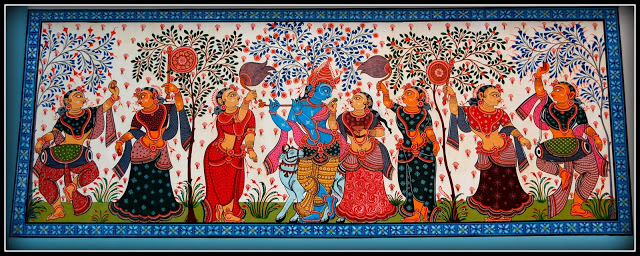
The first time I heard Kirtan, call-and-response devotional music, I giggled uncontrollably.
I nervously imagined myself as one of the Hare Krishnas I saw dancing in the New York City streets in the ’70s. I have lately unexpectedly become a die-hard Krishna Das fan and, like devotees of the Grateful Dead and Phish, I follow him.
“I’m Jewish on my parents’ side” is how Krishna Das aka KD, born Jeffrey Kagel, describes his background. He’s the Grammy-nominated rock star of Kirtan, an exceptionally talented singer and harmonium player.
His latest album, Kirtan Wallah, features a mix of Eastern music with folk and blues. KD, a generation older than me, is a charming, self-deprecating 67-year-old. He jokes about his adolescence as a non-practicing Jew on Long Island watching too much TV, then changes to seriously conveying how chanting affects him.
When I first listened to KD’s voice, I was immediately entranced by his sonorous, deeply resonant sound that calmed me like an endless ohm. I play his music when I teach yoga or practice on my own.
However, at the local “kosher” yoga studio and JCC where I work, the students are predominantly Orthodox Jews and I refrain from playing his music in class so I won’t offend anyone.
My self-restraint points to a much larger conflict.
As a Jewish day-school graduate, I’m quite uncomfortable with the content of devotional music.
In my imagination, I don a sari and decorate my forehead with bindi as I connect to the beautiful Sanskrit words and melodies. I try ignoring the meanings behind the words in the chants—soulful repetitions of the names of God. They may also be described as prayers to the names of Hindu deities, considered “avodah zara”—idol worship, a definite no-no, a grievous sin to practicing Jews.
I met KD at the Heart of Devotion workshop he led at Kripalu Yoga Center with Sharon Salzburg, founder of Insight Meditation Society in Massachusetts. Salzburg, also Jewish, told me her identity isn’t defined as either Buddhist or Jewish. She and KD were friends in India when he searched for his spiritual path and she studied meditation.
I spoke with them about my mixed feelings towards kirtan. KD advised me to simply let go of my guilt and fear since they don’t serve me. Easier said than done for this Jewish mama.
Salzburg told me to “pick and choose;” ignore the words that don’t work for me while enjoying the the music I love. I laughed out loud, since I already refer to my inconsistent self as a pick-and-choose Jew. KD said I shouldn’t worry myself sick by overthinking this, but continue worshipping in my own way, as per the Dalai Lama’s advice, while incorporating the music. Sharon referred me to Sylvia Boorstein, an observant Jew who teaches meditation at the Upper West Side JCC.
I asked Das whether the different Hindi names of G-d refer to attributes like we have in Judaism, with G-d’s actual name being unpronounceable. He replied that there is “only one sun” and all religions respect that. He claims to be against organized religion and jokingly disparages Christianity along with Judaism, though he exclaimed that Pope Francis is cool.
Krishna Das means “servant of Krishna,” a name that his guru Maharaj-ji gave him. He spoke reverently about Maharaj-ji and his need to be close to him, voluntarily serving him through his singing. KD’s path involves focusing on happiness (which is supposed to be our natural state), on the beauty of singing, on being totally in the moment while chanting, returning his mind again and again to the music and words, a singing meditation.
Mediterranean, Indian and Mid-Eastern music makes my heart sing.
Though I enjoy singing prayers at my synagogue, rarely do the melodies feel as powerful as KD’s songs; one exception is the prayer Anim Zmirot from the Shabbat liturgy, which guiltily reminds me of the Hanuman Chalisa, a beautiful chant.
I love Idan Raichel whose songs incorporate phrases from Psalms and draw from Israeli, South American and Ethiopian cultures.
I’m into Rabbi Zach Fredman, spiritual leader and musical director at the New Shul. He plays an oud while singing heart-opening Jewish devotional songs. His album Epichorus is a play on the Hebrew word apikoros—heretic. Not coincidentally, his music is inspired by time spent in India.
Whatever brought Jeffrey Kagel to Hindi devotional music is his personal path, not mine. I ohm, clap and dance to his band’s incredible sound and don’t feel heretical. I’m confident that this penchant won’t lead me astray from my Judaism.
As I am deeply touched by the brilliant brushstrokes of other religions’ artworks, so am I inspired by the inviting rhythms of kirtan.
Love elephant and want to go steady?
Sign up for our (curated) daily and weekly newsletters!
Apprentice Editor: Hannah Harris / Editor: Catherine Monkman
Photo: Pixoto











Read 11 comments and reply